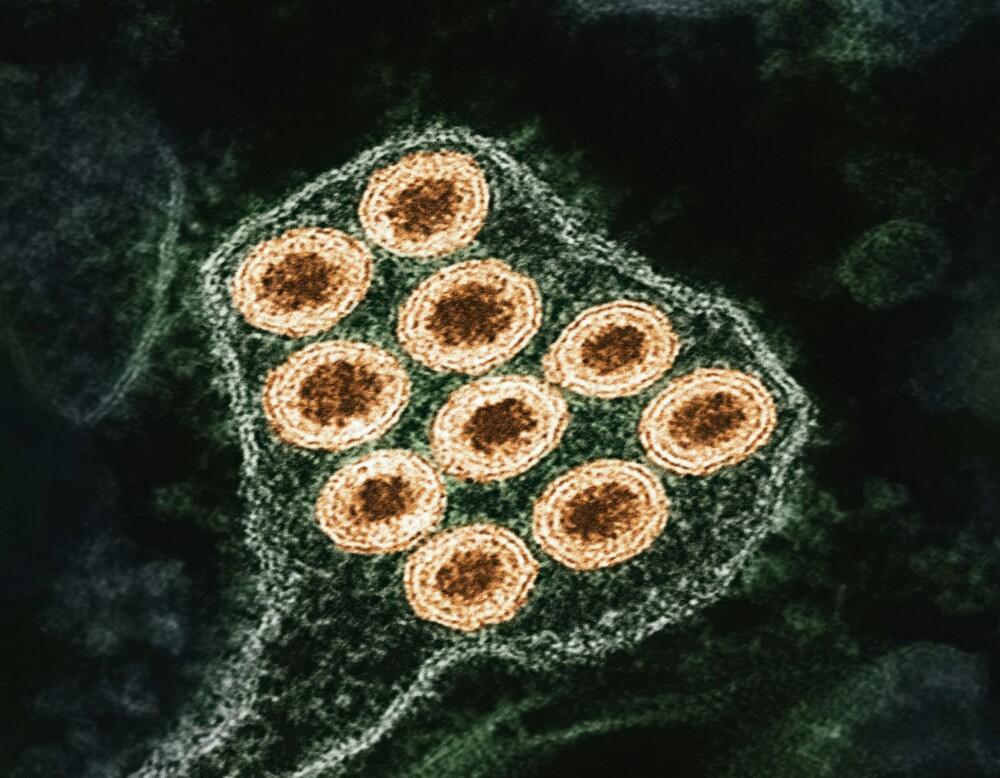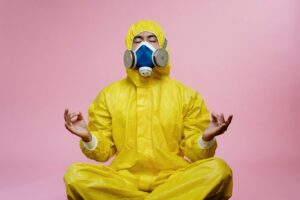Can EBV Trigger Long COVID? NYC Naturopath Guide

What Is Epstein-Barr Virus and What Makes It Unique?
Epstein-Barr Virus (EBV) is a type of herpes virus (human herpesvirus 4). It is highly contagious and is one of the most common viruses in the world. It is spread through saliva and other bodily fluids. EBV is known for causing mononucleosis, or “mono”, among other diseases.
EBV integrates into its host and lies dormant for many years, sometimes for a person’s entire life. It persists in resting memory B-cells where it remains inactive, evading immune detection. It can become reactivated and cause symptoms again later in life, regardless of when you first acquired the virus.
What Are Long COVID and Chronic Fatigue Syndrome?
Long COVID is a condition where individuals experience long-term, ongoing symptoms or health problems after infection with SARS-CoV-2 infection, the virus that causes COVID-19. Symptoms vary, but may include debilitating fatigue, shortness of breath, brain fog, muscle aches, and more. Symptoms can last for weeks, months, or even years after initial infection.
Chronic Fatigue Syndrome (CFS)/Myalgic Encephalomyelitis (ME) is a complex condition characterized by extreme, persistent fatigue that doesn’t improve with rest and significantly impairs daily functioning. Other symptoms like sleep problems and difficulty with cognition often accompany it. It’s not known what causes CFS/ME, but common triggers seem to be viral infections, immune system dysregulation, and various forms of stress. In our experience, we see a lot of patients diagnosed with CFS having chronic viral reactivations and Lyme Disease.
Long COVID and CFS/ME can present with significant symptom overlap, making diagnosis challenging. Patients of both conditions often experience multisystem involvement that can cause an overlap in clinical symptoms, such as:
- Extreme fatigue
- Widespread pain
- Cognitive difficulties
- Sleep disturbances
- Mood changes
- Post-exertional malaise
- Brain fog
- Orthostatic intolerance (dizziness, lightheadedness, or fainting upon standing)
- Nonrestorative sleep
- Dysautonomia (autonomic nervous system dysfunction)
What Does the Research Say About EBV and Long COVID?
Several recent studies show that patients with COVID-19 are at higher risk for reactivating latent EBV and are therefore at higher risk for experiencing Long COVID symptoms.
Research done by the National Institutes of Health (NIH) suggests a possible link between the reactivation of Epstein-Barr Virus and Long COVID, especially in patients with symptoms of fatigue. Studies showed that reactivated EBV antibodies in the throat were more common in Long-COVID patients who were experiencing fatigue, even months after initial COVID infection, when the SARS‐CoV‐2 virus was no longer detectable. This suggests that EBV reactivation could be a contributing factor to the severity of symptoms of Long COVID, and not a consequence of it.
Emerging evidence also supports the notion that the COVID-19 virus may be responsible for the reactivation of latent viral infections, such as EBV, among others. COVID-19 exacerbates dormant viruses, causing a chronic inflammatory state. This chronic inflammation contributes to the complexity and severity of Long COVID symptoms.
How Might EBV Contribute to Long-Term Post-Viral Illness?
Reactivated EBV disrupts immune homeostasis. EBV viral remnants activate the immune pathways in several ways, and have been shown to contribute to long-term post-viral illness by:
- causing chronic inflammation
- Dysregulating the immune system
- impairing mitochondrial function
- Inflaming the vagus nerve
These mechanisms are all interconnected and can create a vicious cycle of inflammation, especially when it comes to neurodegenerative disease.
Chronic Inflammation and Dysregulated Immune System
EBV significantly influences T-cell and B-cell function. The virus primarily infects B cells and then modulates T-cell responses to avoid detection and establish dormant and persistent infection. The infected B cells produce cytokines, which promote systemic inflammation and immune dysregulation.
Impaired Mitochondrial Function
EBV disrupts mitochondrial function, which can trigger an immune response and the production of pro-inflammatory cytokines. These cytokines, in turn, can further impair mitochondrial function and exacerbate neuroinflammation, further contributing to the cycle.
Inflamed Vagus Nerve
The vagus nerve runs from the brainstem to the heart, lungs, digestive system, and other vital organs. It is part of the parasympathetic nervous system and is crucial to controlling inflammation, breathing, heart rate, digestion, and stress response in a resting state. When the vagus nerve becomes inflamed, all of the systems it controls are impacted. Inflammation can cause prolonged symptoms common with Long COVID, such as:
- neurological symptoms
- breathing issues
- dysregulated heart rate
- digestive distress
How Is Epstein-Barr Implicated in CFS/ME?

There are several factors for how EBV has been implicated in the disease mechanisms of CFS/ME, including chronic immunity, periodic reactivation, and genetics, all of which could contribute to symptoms.
- Chronic Immunity – EBV infection could lead to a prolonged, persistent activation of the immune system.
- Reactivation – EBV may also reactivate periodically, which can cause ongoing symptoms in people with CFS/ME.
- Genetics – A family history may increase your risk for developing CFS/ME.
While EBV is not the only virus that has been linked with CFS/ME, some theories suggest that EBV may trigger CFS/ME through the production of specific proteins that cause inflammation of the brain and spinal cord or by impairing the body’s ability to effectively fight off the virus.
These studies show that a significant portion of CFS/ME patients show evidence of EBV reactivation, altered EBV-specific antibodies, or even a history of infectious mononucleosis triggered by EBV. This is suggestive of how the virus may play a role in the viral history of CFS/ME and the correlation of symptoms, like:
- Chronic fatigue
- Post-exertional malaise
- Immune profiles
- Cytokines
- Oxidative stress
What Do Testing and Lab Work Reveal?
Antibody tests help determine if someone has been infected with EBV, whether the infection is recent or past, and the stage of the infection. Typical antibody tests used to detect EBV include:
- VCA IgM – Detects a recent or current EBV infection, usually appearing 4-6 weeks after infection. Sometimes we do see this come up in a reactivation.
- VCA IgG – Indicates past exposure to EBV, as it persists for life after an infection.
- EBNA (Epstein-Barr nuclear antigen) – Indicates past exposure and infection, typically appearing 2-4 months after the initial infection.
- EA (Early antigen) – Detects antibodies to the early antigen, which can indicate a recent infection, reactivation, or chronic infection.
Functional medicine practitioners often use a combination of conventional and specialized testing to assess EBV activity and its impact on the body. They help differentiate between past infection and current immune dysfunction by analyzing antibody profiles and looking for immune biomarkers.
Functional medicine lab tests help detect patterns of reactivation or immune strain. These labs assess the body’s immune response to EBV infection, including T-cell responses and antibody levels, to determine the status of EBV infection and potential risks.
Functional medicine lab testing may include:
- EBV antibody tests
- EBV DNA testing (to assess viral load)
- Specialized tests like T-cell immunity tests
By analyzing these different antibody profiles and using additional tests, functional lab results can provide valuable insights into EBV infection status and help differentiate between past infection, acute infection, and cases where immune dysfunction may be affecting the body’s response to the virus.
In addition to lab testing, functional medicine practitioners may investigate other factors contributing to EBV reactivation or chronic illness, such as gut health, inflammation, and toxicity, to help guide treatment approaches.
Can Naturopathic Therapies Support Post-Viral Recovery?

Naturopathic medicine can support the immune system and improve post-viral recovery. There is a lot of overlap between treatment plans for EBV, Chronic Fatigue, and long COVID when it comes to pacing of treatment, nutrient replenishment, and herbal therapies.
Natural therapies for post-viral recovery help boost immunity, enhance resilience and modulate inflammation and fatigue. Treatments will focus on:
- Anti-inflammatory protocols
- Mitochondrial repair strategies
- Vagus nerve stimulation
- Cortisol support
- Cellular elimination
Anti-inflammatory protocols
Naturopathic protocols against viral infections involve supporting the immune system by decreasing inflammation through replenishing nutrients with whole foods and supplementation, implementing lifestyle changes and focusing on sleep and stress, and utilizing antiviral and adaptogenic herbal therapies.
Some of our favorite herbal therapies used for post-viral infection include:
- Curcumin – a powerful anti-inflammatory, and acts as an antifungal, antibacterial, and antiviral compound. It’s been shown to inhibit replication in a variety of viruses.
- NAD+ – anti-inflammatory, antiviral, improves cognitive function, boosts energy. NAD+ has shown promise in treating and preventing COVID and other viral infections.
- CoQ10 – An antioxidant that reduces oxidative stress and helps repair mitochondrial function in patients who are deficient in CoQ10. In our practice, we like to use ubiquinol when possible, a more absorbable form of CoQ10.
- Ashwagandha – an adaptogenic herb that helps reduce inflammation, boost immunity and resilience to stress.
- Glutathione – “the master antioxidant”- it reduces oxidative stress, neutralizes free radicals, modulates immunity, supports detoxification, and protects cells from damage.
- NAC (N-Acetyl Cysteine) – An antioxidant that can help protect cells from oxidative damage and promote mitochondrial health.
- ALA (Alpha Lipoic Acid) is A powerful antioxidant that can help protect mitochondria from damage.
Mitochondrial Repair Strategies
Strategies for mitochondrial repair involve boosting the function of mitochondria and reducing oxidative stress. These strategies aim to prevent or alleviate inflammation by addressing mitochondrial dysfunction, such as:
- Diet – A nutrient-dense diet rich in antioxidants, omega-3 fatty acids, and essential nutrients that can support mitochondrial health and reduce oxidative stress.
- Gut support – Repairing and restoring the gut lining to help support nutrient absorption and decrease inflammation.
- Stress reduction – Stress reduction techniques, such as meditation or deep breathing, can help reduce chronic stress that contributes to inflammation and poor mitochondrial health.
- Exercise – Regular exercise, especially aerobic exercise and resistance training, can increase mitochondrial biogenesis, enhance mitochondrial efficiency, and improve overall energy production.
Vagus nerve stimulation
New research has demonstrated that Vagus Nerve Stimulation (VNS) treatments have helped relieve the above symptoms in patients with Long COVID, controlling the inflammatory response and lessening cytokine storms, two major factors in long-term post-viral conditions like Long COVID.
FAQs
Is EBV causing my long COVID symptoms?
Studies have shown that EBV may be a co-factor in Long COVID symptoms for some people. The best way to find out if EBV is a factor in your Long COVID symptoms is to talk with a functional medicine practitioner or naturopath. They can assess your symptoms and order the right types of tests to identify the underlying cause of your symptoms and help guide treatment approaches.
Can I test for both EBV and long COVID at the same time?
You can test for EBV and COVID at the same time. However, when it comes to long COVID, you may have symptoms long after the SARS-CoV-2 virus can be detected. EBV may become reactivated during COVID infection, which can contribute to long COVID symptoms in some individuals.
Are there proven treatments if both EBV and COVID are present?
Yes. Natural interventions for EBV and COVID recovery are available to help reduce inflammation and enhance immunity, build resilience, and increase energy. Treatments may include anti-inflammatory protocols, strategies to repair mitochondria, and Vagus Nerve Stimulation.
Is EBV the root cause or a co-factor in Long COVID symptoms?
According to studies, EBV appears to be a co-factor in the development of Long COVID. However, research is ongoing to determine other contributing factors to the illness.
Does EBV mean I’ll always be tired?
There is currently no cure for EBV, but that doesn’t mean you’ll have symptoms, like fatigue, forever. Once infected, the virus usually goes dormant in the body for life. While it can reactivate at any time, most people recover from the initial infection within a few weeks. Working with a Naturopathic Doctor can help you support reactivated EBV that is causing you significant fatigue.
Final Thoughts: Mapping the Overlap Between EBV, Long COVID, and Chronic Fatigue
EBV may not cause Long COVID or CFS/ME alone, but research has shown that there can be an overlap among the three conditions for some people.
If you are suffering from Chronic Fatigue or Long COVID, a thorough evaluation from a naturopathic practitioner can help you determine if EBV is at play and guide treatment approaches based on the contributing factors for your symptoms, including a look at gut health, sleep, stress, and other areas that may be at play.
Post-viral patterns require a nuanced approach, and recovery paths benefit from multidisciplinary insight. A qualified practitioner will help you create an integrative and personalized plan for recovery.
Start your healing journey with us…
- Post Title : Can Epstein-Barr Virus Trigger Long COVID or Chronic Fatigue Syndrome?
- Author: Dr. Susan Cucchiara, N.D.
- Clinically reviewed by - Dr. Susan Cucchiara, N.D.
- Date Published :


